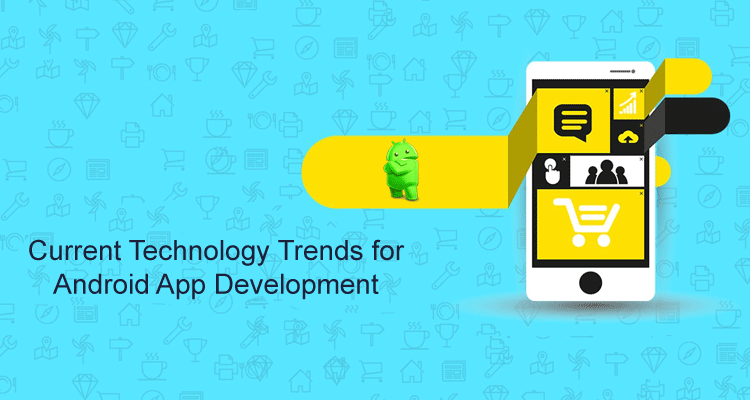Current Technology Trends for Android App Development

Smartphone dominates the mobile industry with its extravagant features and mobile apps. As per research, the number of smartphone users is forecast to grow from 1.5 billion in 2014 to around 2.5 billion in 2019. Just over 36 percent of the world’s population is projected to use a smartphone by 2018, up from about 10 percent in 2011.2019 is here and it is bringing a new future of android technology trends.
1) Accelerated Mobile Pages (AMP) Is Changing Web App Landscape:
In August, Google announced Accelerated Mobile Pages (AMP) would be moving beyond “Top Stories” into the main organic mobile search results. Today, AMP officially rolls out broadly in mobile search. It’s been 3 years since Google has started the AMP Project. Apart from that, Google announced that there will be a separate search index for the mobile web.
2) Artificial Intelligence Is Real Now
The story of Artificial Intelligence hype has a considerable business history in 2019. AI is increasingly being absorbed into just about every business sector. Once an investment in the future, it is now
3) Cloud-Driven Mobile Apps Are Rising
Now, we can expect powerful mobile apps which directly fetch data from the cloud and take minimum space in your smartphone internal memory. Google Drive, Dropbox, & OneDrive are only the tip of the iceberg.
The advantage of using mobile cloud computing
• Mobile devices can have access to back-end business apps.
• More mobile apps can be made available to broader customers.
• Multiple security apps can be run on the mobile cloud for a high-security checkup.
• The shortage of storage problem in the mobile device can be solved.
• For business, it gives more control of data and high security.
4) Enterprise Apps & Micro-apps Will Advance Further
The Prime goal of an enterprise mobile app is to help you restructure, streamline and manage crucial business processes on the go. Whereas, A micro-app aims to suffice very targeted operations and takes less load. However, both are successfully accomplishing their endeavors and are expected to continue further.
5) More Focus On Security In Apps
Mobile devices allow us to do nearly everything online—from anywhere, at any time. We can do our banking, track our fitness, control Internet of Things devices in our homes, shop, and even work remotely. Driving this mobile productivity are a multitude of mobile apps—software that connects to APIs and servers around the world to deliver data, services, and, ultimately, value and convenience to users. As per a Gartner prediction, 75% of mobile apps would not pass even basic security tests. In support, an HP study states that 70.6% of apps can access to external storage and 94.7% apps include logging methods. Hackers will tend to continue with the trend of exploiting known security gaps in mobile apps for stealing sensitive and confidential information. This is one of the negative mobile app development trends that is going to continue next year. However, some JavaScript frameworks can help you develop a secure and scalable mobile application.
6) M-Commerce Is Becoming A New Standard
m-commerce (mobile commerce) is the buying and selling of goods and services through wireless handheld devices such as smartphones and tablets. As a form of e-commerce, m-commerce enables users to access online shopping platforms without needing to use a desktop computer. Examples of m-commerce include purchasing, mobile banking, virtual marketplace apps like the Amazon mobile app or a digital wallet such as Apple Pay, Android Pay
7) Internet of Things Will Be Much Bigger:
The Internet of Things, or IoT, refers to the billions of physical devices around the world that are now connected to the internet, collecting and sharing data. Thanks to cheap processors and wireless networks, it’s possible to turn anything, from a pill to an airplane to a self-driving car into part of the IoT. This adds a level of digital intelligence to devices that would be otherwise dumb, enabling them to communicate real-time data without a human being involved, effectively merging the digital and physical worlds. The rapid adoption of cloud-based apps brings us to one of the latest mobile app development trends that have piqued mobile developer interest in 2019 – the Internet of Things or IoT.
8) Beacons & Location Based Services Are on the rise
Beacon technology is a relatively new way of delivering location-based services. The leading proponent has to date been Apple with its iBeacon technology, which is Apple’s own trademarked variant of the beacon standard. A beacon is a low energy Bluetooth chipset known as Bluetooth Smart which has its own integrated power source and emits a 2.4GHz signal which communicates with a smartphone to pinpoint your position to within 200 feet. The big opportunity for marketers is the ability to combine the location information derived from beacons with other customer information to generate personalized offers and communications, enhancing the customer experience and maximizing marketing ROI. Integrated location-based service applications like Apple’s iBeacons and Google Beacon are popular. Wi-Fi usage will no longer be limited to hotels, restaurants, retail outlets and in health-care. The usage of applications with Wi-Fi support is going to rise beyond these traditional requirements will help people with relevant location-based information. Advanced technology gives a major scope to personalized app marketing and expected to rise in 2019 considering one of the major mobile app trends.
9) Chatbots
Chatbots are digital applications that simulate the human way of conversation to help users meet their requirements. A chatbot is

